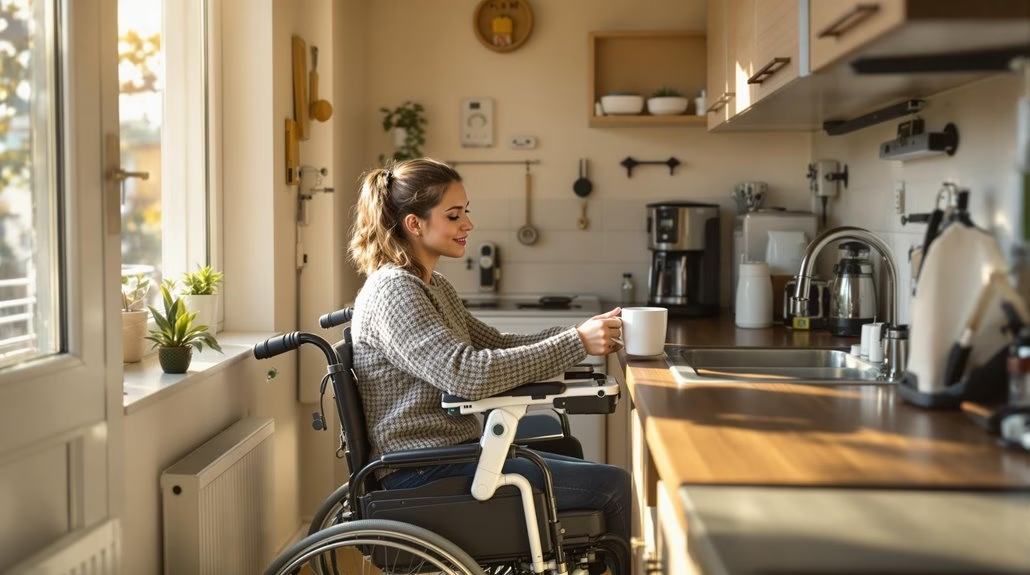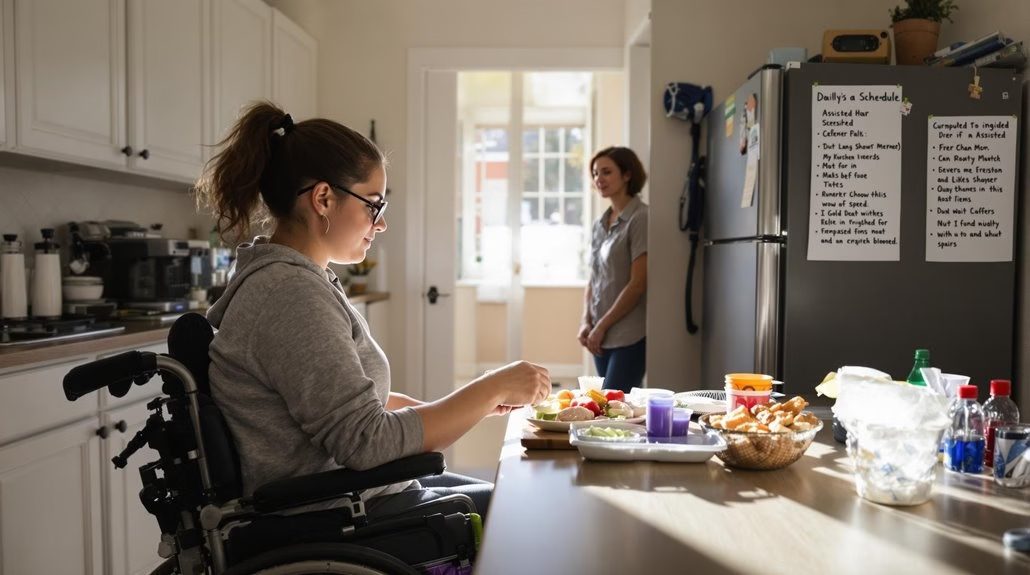Caring for someone with cerebral palsy requires significant dedication and physical effort. You’ll need to assist with daily tasks like feeding, bathing, and mobility, while managing medical appointments and therapies. It’s challenging but manageable with proper support networks and resources. The key is balancing the physical demands with your own self-care needs. With the right knowledge and strategies, you can provide effective care while maintaining your wellbeing.
Understanding the Daily Challenges of CP Caregiving
When caring for someone with cerebral palsy, you’ll face unique challenges that require patience, dedication, and adaptability. Daily tasks like feeding, bathing, dressing, and mobility assistance often demand specialized knowledge and physical strength.
You’ll need to learn proper lifting techniques and how to use adaptive equipment to prevent injury to both yourself and your loved one.
Communication strategies play a crucial role, as many individuals with CP may have speech difficulties. You’ll need to develop effective ways to understand their needs and desires, whether through assistive devices, sign language, or interpreting non-verbal cues.
Clear, consistent communication methods are essential when caring for someone with cerebral palsy, whether using technology, signs, or body language.
Managing medical appointments, medications, and therapy sessions will become part of your routine. Remember that each person with CP has different abilities and limitations, so you’ll need to tailor your caregiving approach to their specific needs.
Our personalized care assessment process helps create a customized plan focused on your loved one’s health, comfort, and safety.
Physical Care Requirements and Mobility Support
Supporting mobility and providing physical care for someone with cerebral palsy requires proper body mechanics and specialized equipment. You’ll need to assist with transfers, positioning, and daily activities while using mobility aids like wheelchairs, walkers, or gait trainers. Following physical therapy recommendations helps maintain proper form and prevent injury. Expert caregivers provide specialized training in mobility support and fall prevention techniques to ensure safety and independence.
| Care Type | Equipment Needed | Frequency |
|---|---|---|
| Transfers | Lift/Sling | 4-6x daily |
| Positioning | Support cushions | Every 2-3 hrs |
| Exercise | PT equipment | As prescribed |
| Hygiene | Bath chair | 1-2x daily |
| Mobility | Walking aids | As needed |
Remember to protect your back by bending at your knees, keeping your spine straight, and using assistive devices when needed. Regular communication with physical therapists guarantees you’re using current best practices for mobility support and maintaining ideal physical care standards.
Managing Medical Appointments and Therapies
People with cerebral palsy typically require multiple medical appointments and therapy sessions throughout the year.
You’ll need to manage appointment scheduling with various specialists, including neurologists, orthopedists, physical therapists, occupational therapists, and speech therapists.
To stay organized, keep a detailed calendar of all medical visits and therapy coordination efforts.
You’ll want to maintain records of medications, treatment plans, and progress notes from each healthcare provider.
Consider using a digital scheduling app or planner to track appointments and set reminders for follow-ups.
If you’re working with insurance companies, you’ll need to monitor coverage, authorizations, and payment responsibilities.
Don’t hesitate to ask healthcare providers about telehealth options when appropriate, as this can reduce travel strain on both you and your loved one.
Medicaid home health services can provide cost-effective support for managing medical appointments and therapy needs while maintaining care in a comfortable home setting.
Feeding, Nutrition, and Dietary Considerations
Many individuals with cerebral palsy face unique challenges with eating and drinking due to difficulties with muscle control, swallowing, and coordination.
You’ll need to understand proper feeding techniques and work closely with their healthcare team to follow specific nutritional guidelines. Consider using adaptive utensils to make mealtimes easier and safer for both you and your loved one.
When planning meals, you’ll want to account for their food preferences while ensuring adequate calorie intake and meeting all hydration needs.
Some individuals may have dietary restrictions or require modified textures to prevent choking.
Take time to create a structured meal planning routine that incorporates nutrient-rich foods and accommodates any special dietary requirements.
Remember to monitor their weight and eating patterns, adjusting portions and food choices as needed to maintain ideal nutrition.
Working with a caregiver who specializes in medication adherence support can help ensure proper nutrition and medication timing during meals.
Building an Effective Support Network
When caring for someone with cerebral palsy, establishing a robust support network becomes essential for both the caregiver and the individual receiving care. You’ll find strength in connecting with others who understand your journey and can provide practical assistance.
| Support Resource | Benefits |
|---|---|
| Local support groups | Emotional connection and shared experiences |
| Online communities | 24/7 resource sharing and advice |
| Healthcare team | Professional guidance and medical support |
| Family members | Reliable help with daily care routines |
| Community services | Respite care and specialized assistance |
Don’t hesitate to reach out to social workers who can connect you with valuable resources in your area. They’ll help you identify support groups, educational programs, and potential funding sources. Remember, building a strong network isn’t just about receiving help—it’s about creating sustainable care that benefits everyone involved. Skilled nursing support and daily living assistance are essential components covered under Florida Community Care Insurance to help maintain independence at home.
Emotional Aspects of CP Caregiving
Building a support network helps manage the practical demands of caregiving, but the emotional journey deserves equal attention. As you care for someone with cerebral palsy, you’ll need to develop emotional resilience and effective coping mechanisms to prevent caregiver burnout.
Focus on maintaining your mental health through stress management techniques like meditation, exercise, or counseling. The relationship dynamics between you and your loved one will evolve, making clear communication strategies essential.
Don’t hesitate to express your feelings and concerns openly. Consider joining support groups where you can connect with others who understand your experiences. These communities provide valuable emotional outlets and practical advice.
Creating Accessible Living Spaces
Creating a safe and accessible living environment requires thoughtful modifications that support independence and mobility for someone with cerebral palsy.
You’ll need to carefully assess each room and make strategic changes that promote both safety and autonomy. Adaptive technology and sensory friendly spaces play vital roles in enhancing daily living activities.
- Install slip-resistant flooring and remove obstacles to create clear pathways for wheelchairs or mobility devices.
- Mount grab bars in bathrooms and guarantee doorways are wide enough for easy navigation.
- Adjust counter heights and cabinet placement for wheelchair accessibility and reachability.
- Add smart home features like voice-controlled lighting and automated doors to increase independence.
Remember to regularly evaluate and update these modifications as needs change and new adaptive technologies become available.
Balancing Caregiver Self-Care With Responsibilities
Taking care of someone with cerebral palsy can be physically and emotionally demanding, so maintaining your own well-being is essential for providing sustained, quality care.
To prevent caregiver burnout, you’ll need to prioritize self-care activities like regular exercise, proper nutrition, and adequate sleep.
Effective time management helps you balance caregiving duties with personal needs. Schedule regular breaks throughout the day, and don’t hesitate to ask family members or professional caregivers for help when you need time off.
Consider joining a support group to connect with others who understand your challenges and can share valuable coping strategies.
Remember that taking care of yourself isn’t selfish – it’s necessary to remain strong and capable of providing the best possible care for your loved one with cerebral palsy.
Conclusion
Taking care of someone with cerebral palsy is like being part of a caring team where everyone works together. While there will be daily challenges, you’re never alone on this journey. Think of it as learning to navigate a new path – each day brings opportunities to learn and grow together. With some planning, learning, and help from others, you can give great care while also taking care of yourself.
Just like a garden needs different tools to grow, caring for someone with cerebral palsy requires various types of support. It’s perfectly normal – and important – to ask for help when you need it. Taking breaks isn’t selfish; it’s necessary to keep your energy flowing so you can be there for your loved one.
Remember, Focus Family Care understands your journey and stands ready to support you every step of the way. We’re here to help lighten your load and provide the expertise you need.
If you or a loved one need help, don’t wait. Reach out to Focus Family Care today at (561) 693-1311 or email us at info@focusfamilycare.com.





